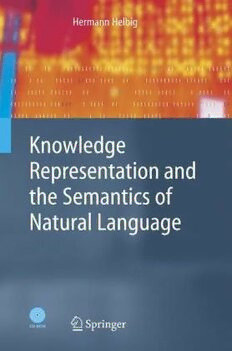
Knowledge representation and the semantics of natural language: with 258 figures, 23 tables and CD-ROM PDF
651 Pages·2005·4.41 MB·English
Most books are stored in the elastic cloud where traffic is expensive. For this reason, we have a limit on daily download.
Preview Knowledge representation and the semantics of natural language: with 258 figures, 23 tables and CD-ROM
Description:
The book presents an interdisciplinary approach to knowledge representation and the treatment of semantic phenomena of natural language, which is positioned between artificial intelligence, computational linguistics, and cognitive psychology. The proposed method is based on Multilayered Extended Semantic Networks (MultiNets), which can be used for theoretical investigations into the semantics of natural language, for cognitive modeling, for describing lexical entries in a computational lexicon, and for natural language processing (NLP). Part I deals with fundamental problems of semantic knowledge representation and semantic interpretation of natural language phenomena. Part II provides a systematic description of the representational means of MultiNet, one of the most comprehensive and thoroughly specified collections of relations and functions used in real NLP applications. MultiNet is embedded into a system of software tools comprising a workbench for the knowledge engineer, a semantic interpreter translating natural language expressions into formal meaning structures, and a workbench for the computer lexicographer. The book has been used for courses in artificial intelligence at several universities and is one of the cornerstones for teaching computational linguistics in a virtual electronic laboratory.
See more
The list of books you might like
Most books are stored in the elastic cloud where traffic is expensive. For this reason, we have a limit on daily download.
